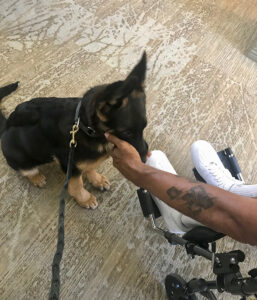By Fran Jewell

A dog that defends its territory or home is not uncommon. This is a behavior inherited from the wolf in defending its territory from another pack. It is intended to secure hunting grounds, food and survival of the pack.
Territorial behavior is not acceptable in dogs that are now domesticated and expected to live peacefully in our human society. What is interesting is that not every dog will have the need to express this behavior. Some breeds are more prone to territorial behavior than others. Herding breeds can be especially prone because their job (while moving livestock is their primary function) is also to warn the shepherd, and sometimes defend the livestock from predatory animals (especially livestock guardian dogs like the Great Pyrenees and Akbash). When we bring working dogs into our homes, then expect them to be good-natured and accepting of all of our guests, it becomes an internal conflict and, ultimately, a source of stress and anxiety for the dog.
For us, as humans, if we allow the dog to display those instinctual behaviors, it could ultimately lead to a bite for the intruder (whether that intruder is dog or human). Obviously, that is not acceptable in our society. The reality is, if your dog expresses his natural instinct and does bite someone, you may very well find yourself in the midst of a lawsuit that can threaten your home.
Yes, there are some breeds (and individuals within any breed) that are much more accepting of people or dogs onto “their” property. Most hunting dogs were bred to focus on their noses, not on protecting the home. So, when choosing a dog, it might be wise to look for a breed that is less likely to be territorial by domestication.
Preventing this instinct from developing is another way you can protect your family from a dog that becomes overly territorial. Remember, first, that most dogs will warn, or alert you, when someone strange is near your car, or in your yard. But, territorial behavior is more aggressive and can threaten or cause a bite. Establishing leadership immediately when you get your dog, and letting your dog know that YOU own the home, not the dog, is imperative. A good leadership program, which lets the dog know YOU are the one that makes the decisions about who comes onto your property, not the dog in his instinctual way, is vital. Remember, leadership is a respectful bond between you and your dog. Leadership is not brutal or unfair. Leadership is benevolent, and it also gives the dog a clear idea about what is and is not acceptable behavior.
Prevention is always the best answer and your attitude is critically important. Leaving a dog to his own devices and doggie problem-solving will always lead to a dog making doggie decisions based on ancestry and instinct, which might not work well in our human society.
Fran Jewell is an IAABC Certified Dog Behavior Consultant, NADOI Certified Instructor and the owner of Positive Puppy Dog Training, LLC in Sun Valley. For more information, visit positivepuppy.com or call 208-578-1565.
